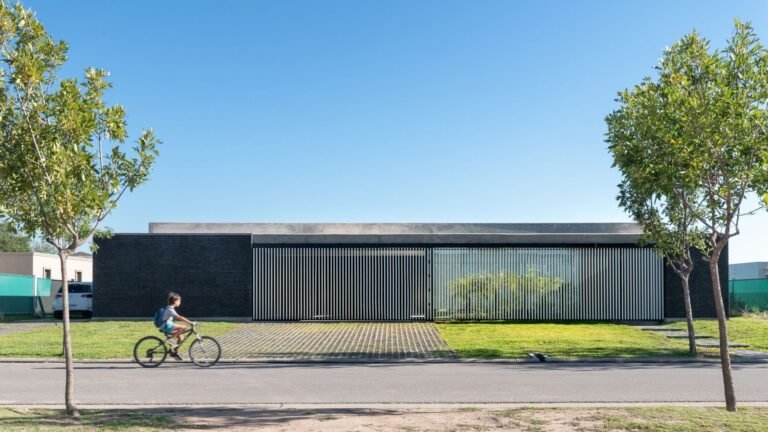ON residence: hotel meets restaurant in an iconic heritage building in thessaloniki’s seafront
The heritage of Olympos Naousa in thessaloniki, GREECE
Occupying a restored heritage building from the 1920’s, ON Residence is a hybrid hospitality project that combines a brand new hotel with the rebirth of one of Thessaloniki’s iconic restaurants, Olympos Naoussa. Right on the Greek city’s seafront, the project unfolds in two layers: the restoration of the original 1926 building; and the newly-built extension, which now occupies the top floors. The design vision behind ON Residence was led by a harmonious balance between the building’s architectural history and modern decorative features, while the eclectic result restores the property’s status as one of Thessaloniki’s landmarks. ‘We could have kept the building as it was and do a very modern interior design, but it would be like a betrayal of the past,’ interior designer Fabienne Spahn tells designboom. ‘This is why, full of respect for its glorious past, the renewal has been done like a natural evolution of the initial restaurant style, like it could have evolved along years without its long closure.’
The building that housed Olympos Naoussa has been through several incarnations, each leaving its mark on Thessaloniki’s cultural zeitgeist. Built in 1926 based on designs by renowned architect Jacques Mosse, the property operated as a beer tasting bar for the local brand Olympos and the ice making factory Naoussa. It first operated as a restaurant in 1927, while during WWII, German occupiers turned the space into a cabaret-music hall. After the war, the building was acquired by a different owner and its true rise as a culinary institution began in 1958. During the restaurant’s golden years, Olympos Naoussa became the heart of Thessaloniki’s jet-setting society, serving as a favorite hangout for celebrities, artists and politicians. The restaurant maintained a cult favorite status among locals until its closure in the mid-90s, while in 1993, the building was declared a cultural heritage site by the Ministry of Culture. In 2017, the CEO of TOR Hotel Group Konstantinos Tornivoukas purchased the property in partnership with Grivalia Hospitality, and gave Olympos Naoussa another chance to begin its journey anew.![]() all images courtesy of ON Residence | image by Heinz Troll (also header image)
all images courtesy of ON Residence | image by Heinz Troll (also header image)
the restoration process BEHIND ON Residence
Set to ‘reawaken’ a cultural landmark from an almost 30-year slumber, the team of architects, designers, owners and experts involved in Olympos Naousa’s renovation focused on finding creative ways to salvage, restore and utilize existing structures and original materials. From the intricate floor tiles to the impressive crown mouldings and trim on the ceilings and to the elegant murals, the restoration process always followed the same line of inquiry: how much of the original materials could be saved, restored and placed back, using exact replicas — faithfully reproduced with the help of experts — to fill in any gaps. Structural elements both in the interior and at the exterior were also preserved and restored, from the marble staircase to the cast iron railings and the wooden wall mouldings. Parts of the walls in the lobby were painted entirely by hand, creating elaborate patterns that pay homage to the mural that was discovered during the restoration process.
‘The entrance of the building with its hand painting damask on the walls has been perfectly renovated in the traditional way instead of having just a copy with a wallpaper,’ Fabienne Spahn explains (read our interview with the designer in full below). In addition to Spahn’s contribution in the interiors, Divercity Architects & Dimitris Thomopoulos were responsible for the project’s architectural development, and Nikiforidis / Cuomo for its exterior spaces and landscape design.![]() image by Heinz Troll
image by Heinz Troll
INTERVIEW WITH INTERIOR DESIGNER Fabienne Spahn
designboom (DB): How did the building’s emblematic past inform its rebirth and design vision?
Fabienne Spahn (FS): I consider that not only the building has an emblematic past but it is also in the heart and history of most of Thessaloniki’s families. All of them have good memories of ON, and it goes toward generations.
We could have kept the building as it was in the past and decide to do a very modern interior design, but it would be like a betrayal of the past.
This is why, full of respect for its glorious past, the renewal has been done like a natural evolution of the initial restaurant style, like it could have evolved along years without this long closure.
DB: What were some of the challenges and restrictions faced due to the building’s cultural heritage status, and how did you work around those?
FS: I never feel these restrictions as a constraint but as a natural respect to the initial aesthetic of the building that I feel very inspiring since the first visit. I have played with the constraints for example with the light green color of the ceiling or the bold colors of the cement tiles by using these colors on the fabrics and decorations.
The fact of not having any transformation on the ceiling, keeping colors and moldings helped a lot to achieve the vintage style expected.
![]()
the restored heritage facade
DB: Can you name a few of the original architectural elements that were preserved or replicated in the new design?
FS: The entrance of the building with its hand painting damask on the walls. This has been perfectly renovated in the traditional way instead of having just a copy with a wallpaper. The cement tiles have been restored and the missing parts have been copied. A fantastic work has been done on the stucco moldings. Some of them have been created in some parts of the building where they did not exist previously due to the architectural reorganization.
![]()
rooms enjoy views of Thessaloniki’s seafront
DB: A big part of ON residence is its iconic restaurant, Olympos Naousa, which reopened after three decades. How did you approach its redesign and in what ways did it influence the project’s overall identity?
FS: As previously explained the way it is redesigned is a continuation of the past. Nevertheless there is a guideline with the art deco style. The more you climb in the building the more the style evolves toward a new vision of art deco. I did not want to copy the style of the past but keep it as a direction to get a consistency to the whole project.
![]()
ON Residence lobby
![]()
Tiger Loop Bar
![]()
the renovated Olympos Naoussa restaurant


